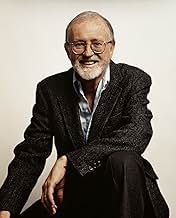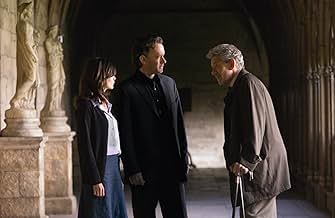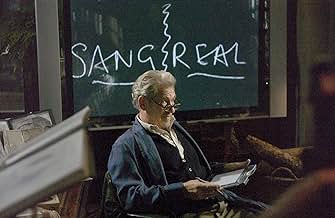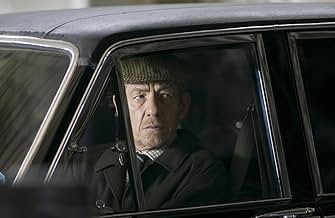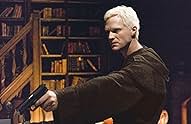Un meurtre à l'intérieur du Louvre et des indices dans des tableaux de Da Vinci ont permis de découvrir un mystère religieux protégé par une société secrète pendant deux mille ans, ce qui po... Tout lireUn meurtre à l'intérieur du Louvre et des indices dans des tableaux de Da Vinci ont permis de découvrir un mystère religieux protégé par une société secrète pendant deux mille ans, ce qui pourrait ébranler les fondements du christianisme.Un meurtre à l'intérieur du Louvre et des indices dans des tableaux de Da Vinci ont permis de découvrir un mystère religieux protégé par une société secrète pendant deux mille ans, ce qui pourrait ébranler les fondements du christianisme.
- Réalisation
- Scénario
- Casting principal
- Récompenses
- 8 victoires et 21 nominations au total
- Docent
- (as Andrew Clark)
Avis à la une
However, years later around three years ago I caught it for the first time on basic cable, and I honestly didn't see what all the criticism was for. Not only was it immersive and intriguing, for the most part, but it had a pretty powerful ending and reveal at the end. It isn't great, so maybe the hype was what triggered so many negative reviews, but it also isn't bad.
I never read the whole book, but understood the premise. If you really want to enjoy this film, you probably should set the book aside and set beside any offense you may take as to the religious conjecture, and just view it as a mystery movie in and of itself. I really enjoyed the ending- the whole final fifteen minutes or so.
7.8/10
As a work of history, the novel is a passel of nonsense, and only those with a bent towards conspiracy theory overload would be foolish enough to believe a minute of it. But as a work of imaginative fiction, "The Da Vinci Code" certainly gives its audience the neck-twisting workout they've paid good money to receive.
It would be pointless to reiterate the plot of a novel that has probably had the biggest readership of any literary work since "Gone With the Wind." Suffice it to say that a mysterious murder in the Louvre sends a Harvard symbologist and the dead man's granddaughter on a clue-driven search for the famed Holy Grail. Along the way, the two uncover a grand conspiracy on the part of a renegade Catholic order to protect a secret that, if it were revealed, could shake the whole of Western civilization down to its very foundations.
Despite the phenomenal - one is tempted to say "unprecedented" - commercial success of his work, Dan Brown is no great shakes as a writer; his characters are, almost without exception, drab and two-dimensional, and his dialogue, when it isn't being overly explicit in pouring out explanations, sounds like it was written by a first-year student in a Writer's 101 workshop. But the one undeniable talent Brown does have is his ability to knit together a preposterously complex web of codes and clues into an airtight tapestry, and to make it all convincing.
The movie is very faithful to the novel in this respect. It moves quickly from location to location, never giving us too much time to question the logic (or illogic) of the narrative or to examine the many gaping plot holes in any great detail. Writer Akiva Goldsman has encountered his greatest trouble in the scenes in which the action stops dead in its tracks so that the characters can lay out in laborious detail the elaborate story behind the clues. Yet, this is as much the fault of the nature and design of the novel as it is of the man given the unenviable task of bringing it to the screen. Moreover, perhaps in the interest of time and keeping the action flowing, Robert and Sophie come up with solutions to the myriad riddles much too quickly and accurately, with a "Golly, gee, could it mean_______?" attitude that borders on the ludicrous. But, somehow, Howard makes most of it work. Perhaps, it's the clunky literal-minded earnestness with which he approaches the subject that ultimately allows us to buy into it against our better judgment.
Tom Hanks is stolid and passive as Dr. Robert Langdon, the college professor involuntarily driven into all this cloak-and-dagger intrigue, but Audrey Tautou has a certain subtle charm as Sophie, the woman who may play more of a part in the unraveling of the mystery than even she herself can imagine. Jean Reno and Paul Bettany have their moments as two of the less savory players in the story, but it is Ian McKellen as Sir Leigh Teabing, an expert on all things related to the Holy Grail, who walks off with the film. His scenery-chewing shtick pumps some much needed life into a tale essentially populated by underdeveloped stick figures.
The religious controversy surrounding both the novel and the film is as ludicrous as it is unjustified. Anyone whose belief system could be seriously shaken by this absurd mixture of unsubstantiated myth-making and plain old-fashioned wild speculation couldn't have had a very solid foundation of faith to begin with.
The rest of us can appreciate "The Da Vinci Code" for what it is, an overblown but epic exercise in code-busting and clue-decoding - in short, the "Gone With the Wind" of whodunits.
Four words - wrong star, wrong director.
Hanks and Howards best work, both together or separately, have been when they embrace intrinsically American values in their films. All their most memorable movies have involved individuals overcoming hardship through an unshakable belief in love and courage, usually set against an outwardly US-centric interpretation of events. Think Apollo 13, Forrest Gump, Cinderella Man, Saving Private Ryan - all fine films, all centred on an American hero rising above their circumstance.
What is conspicuously absent from either man's resume is a European-set, religious-themed mystery thriller. Having sat through their arduous, laborious adaptation of Dan Brown's novel, I can now see why.
The plot is total bunkum - a hodgepodge of "what ifs" and "oh my god" moments spun on the ludicrous premise that Leonardo Da Vinci had some sort of insight into the life of Christ - but loopy story lines have not stopped many films from being enjoyable.
What makes The Da Vinci Code so deathly dull is the heavy-handed, oh-so-serious approach Howard applies to the material. Combining with his cinematographer to give the film a sleepy nocturnal feel (not so clever given the 150min running time), Howard's film is just a constant flow of expository clues that fail to create any tension or engender his leads with any human qualities. Even for those that haven't read the book, a couple of obligatory 'big twists' in the story are very obvious from early-on.
Hanks (looking more like Jim Belushi than ever) and McKellen blather on and on and on about knights and saints and symbols and God as if they were giving a lecture at some Ivy-league school for the supernatural; Audrey Tautou is lovely but has little to do in a role that is plot- not character-driven. Jean Reno ambles thru another of his token French cop parts (he was better in the Pink Panther); Paul Bettany's evil albino Silas at least got some audience reaction, though giggles and guffaws were probably not what he was hoping for.
Whatever sense of fun and excitement the book provided is fully-drained from this adaptation. Come credit time, I had the realisation that all this hokey, airport-novel religious hooey and B-movie plotting would've made for a great X-files episode in that series heyday. As the end-product of a publishing phenomenon and carrying the tag "Years Most-Anticipated", its a boring dud.
The book is always better because you fill in the blanks with your own imagination!!!
You all need to let go of this ridiculous measure for rating a film.
The story in this case is pretty good, the acting is mostly ok and its sets up an effective atmosphere filled with mystique.
Its a good film.
Le saviez-vous
- AnecdotesAudrey Tautou revealed that, during her audition, she asked if she could take a photo of Ron Howard and Tom Hanks to prove that she'd actually met them.
- GaffesThere was no need to know the capsule's combination in order to open it as vinegar is easily frozen in a household freezer. Simply freeze the capsule and then smash it open to reveal the internal message.
- Citations
Robert Langdon: You say you hate history. Nobody hates history. They hate their own histories.
Sophie Neveu: So now you're a psychologist too?
- Crédits fousThe "A" and "V" in the film title are replaced with the "Blade" and the "Chalice" symbols described by Langdon in the movie.
- Versions alternativesThe film was originally shown to the UK censors in an unfinished form, with a temp score and sound mix. The BBFC advised Sony Pictures that sound levels during some acts of violence may be too impactful for the requested "12A" rating, so the film was likely to receive a 15 classification. When formally submitted, the final levels of sound effects on the completed soundtrack had reduced the strength of some acts of violence to an extent which made the film able to get a "12A" rating.
- ConnexionsFeatured in The Amazing Race: Herculean Effort for Some Herculean Dudes (2006)
Meilleurs choix
Détails
- Date de sortie
- Pays d’origine
- Sites officiels
- Langues
- Aussi connu sous le nom de
- El código Da Vinci
- Lieux de tournage
- Sociétés de production
- Voir plus de crédits d'entreprise sur IMDbPro
Box-office
- Budget
- 125 000 000 $US (estimé)
- Montant brut aux États-Unis et au Canada
- 217 536 138 $US
- Week-end de sortie aux États-Unis et au Canada
- 77 073 388 $US
- 21 mai 2006
- Montant brut mondial
- 760 200 455 $US
- Durée2 heures 29 minutes
- Couleur
- Mixage
- Rapport de forme
- 2.39 : 1







